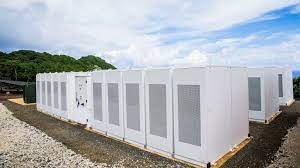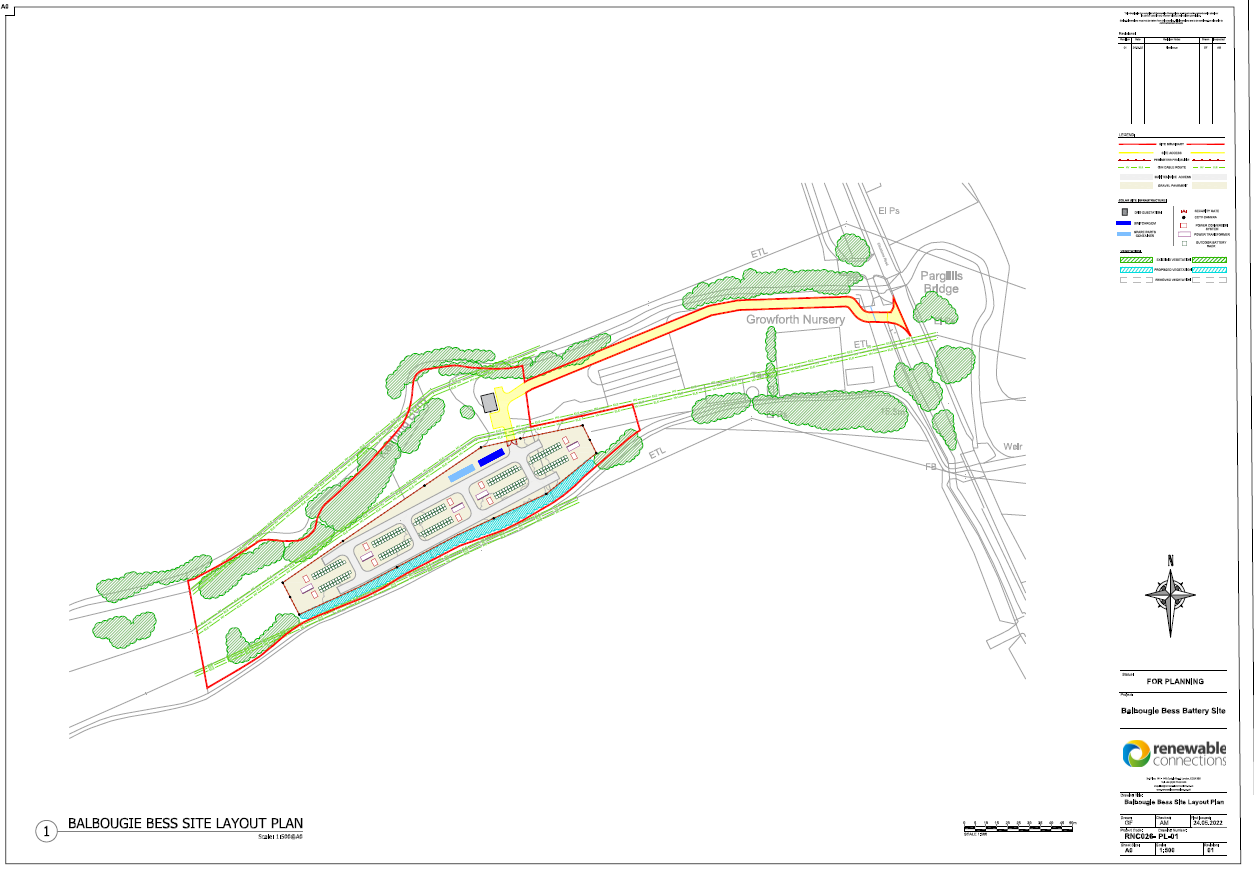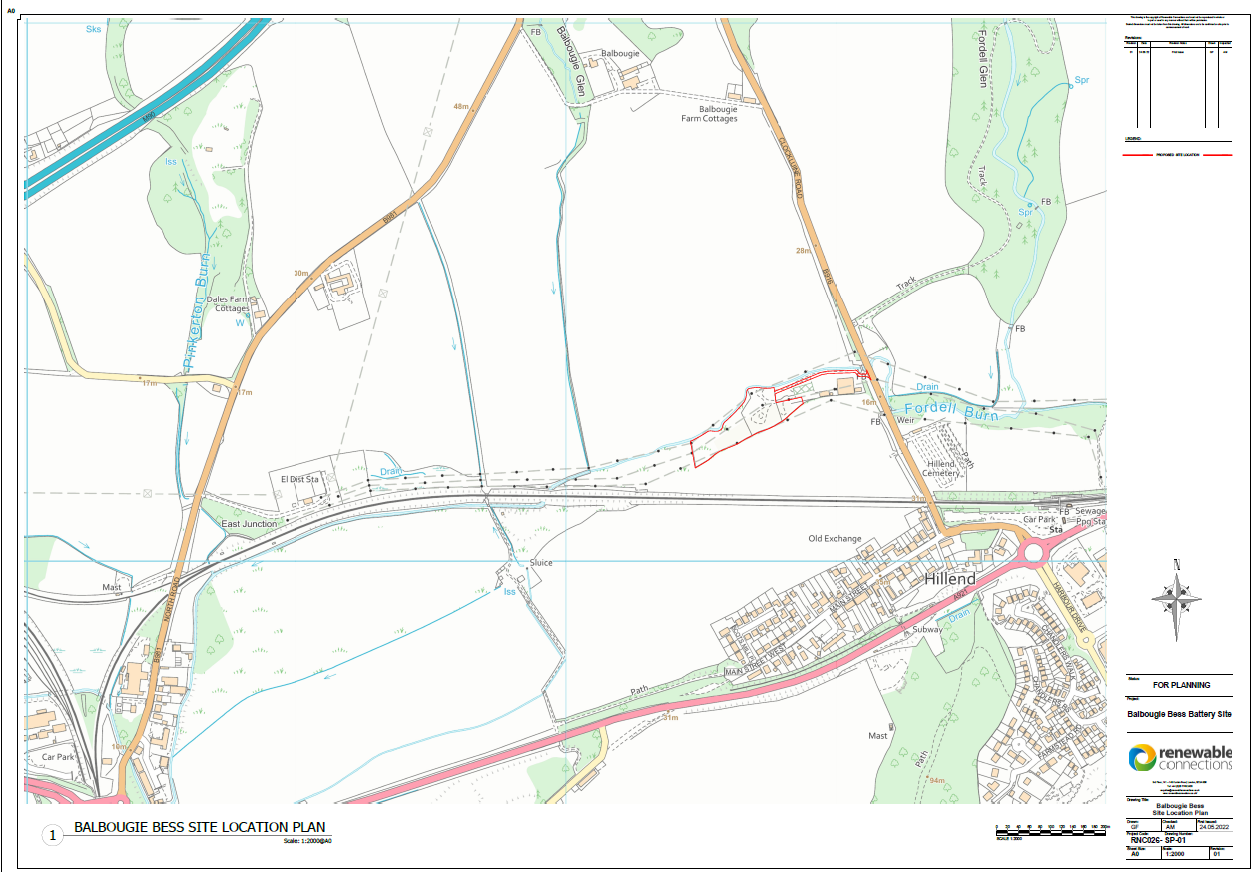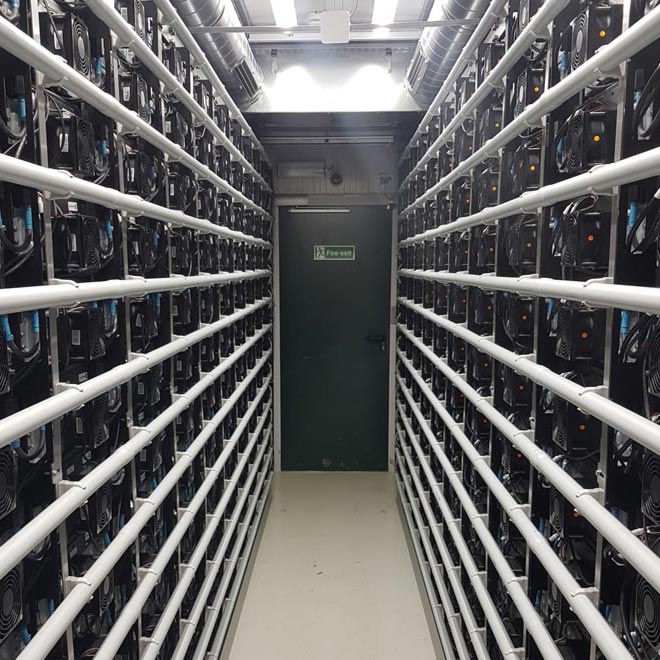BALBOUGIE
BATTERY STORAGE
Renewable Connections Developments has received consent for a Battery Energy Storage System (BESS) up to 42MW near Inverkeithing, Fife. Once operational, the BESS will enable energy from renewables such as solar and wind to be stored and released when customers need power the most. This will help to tackle the climate emergency in Fife by increasing the utility and reliability of renewable energy sources, allowing such sources to comprise a larger part of the local energy mix.
- Battery storage has a key role to play in ensuring homes and businesses can be powered by renewable energy sources, even when the sun isn’t shining or when the wind isn’t blowing.
- Batteries help to manage the peaks and troughs of energy demand, supporting a more stable and reliable national electricity grid that is capable of delivering the transition to decarbonised transport and heating needed to meet the country’s net zero goals.
- The UK Government estimates that the implementation of battery energy storage systems could save the UK energy system up to £40 billion in operating costs by 2050, which will help to reduce individual energy bills.
We welcome any feedback you wish to provide so please do get in touch.
LOCATION
The site is located on land directly to the west of the Plant Market Garden Centre approximately 2km to the northeast of Inverkeithing.
The site is accessed from the east via Clockluine Road through a shared access with the garden centre, and is currently in use as a storage yard in connection with the garden centre. The site is bounded to the north by Keithing Burn, beyond which the land is predominantly in agricultural use. To the west and south, the site is bounded by Mill Lade, the Fife Circle / Edinburgh to Aberdeen rail line, and further agricultural land. Further to the south / southeast is the settlement of Hillend, and to the east lies further agricultural land and woodlands.
OUR PROPOSALS
Once consented and installed, the BESS would provide storage for up to 42MW of electricity and will be operational for up to forty years. After that time, the installation will be removed in its entirety and the land will be restored to its previous use as a storage yard.
The Balbougie BESS will include state-of-the-art Lithium Iron Phosphate (LFP) battery technology, comprising battery storage modules aligned in rows supported by transformer and inverter platforms. The maximum height of the battery storage modules will be less than 3m, which is lower than the existing polytunnel structures connected with the neighbouring garden centre.
The transformer and inverter platforms will be connected via underground cables, as will the point of connection to the existing substation. A 2m high perimeter security fence will enclose the site, and will include free-standing CCTV cameras with infrared lighting pointing inwards towards the site only to ensure the safety and protection of the BESS equipment.
PROJECT TIMELINE
STAGE 1
Site selection
April 2021
STAGE 2
Preliminary Surveys
June 2021
STAGE 3
Pre-application
September 2021
STAGE 4
Community Consultation
February 2022
STAGE 5
Submission
Summer 2022
STAGE 6
Construction
2024
THE NEED FOR THE PROJECT
Following the Scottish Government’s declaration of an Environment and Climate Emergency in April 2019, and Glasgow’s hosting of the global COP26 conference in November 2021, it has been made clear that the construction of new energy storage infrastructure is vital to enable renewable energy sources to replace fossil fuels at the pace required to limit the social, economic, and environmental impacts of climate change.
Fife Council declared their own climate emergency in September 2019, acknowledging that there is limited time to reduce carbon emissions and put a stop to catastrophic climate change. The Climate Fife: Sustainable Energy and Climate Action Plan 2020-2030 sets out the steps to be taken over the next ten years to achieve net zero greenhouse gas emissions by 2045. This includes investing in renewable energy projects and the decarbonisation of transport and heating, all of which will require significant battery storage capacity in order to operate effectively.
The proposed BESS would have a storage capacity of up to 42MW, and would be capable of optimising around 140MW of grid-connected renewable energy projects across the UK to enable them to store power generated during the day and / or during periods of high wind for use during times of peak electricity demand.
FAQ’s
How do battery energy storage systems work?
Battery Energy Storage Systems (BESS) can be charged by electricity generated from renewable energy, such as wind and solar power, which only produce energy under certain conditions. BESS use intelligent software to co-ordinate energy production and to decide when to store or release energy to the national grid to meet peak demand. This improves the stability of the grid network and allows stored renewable energy to be used even when the conditions for generation are not being met.
Why not use nuclear power instead of battery storage?
Whilst nuclear power stations are able to generate a large and consistent amount of electricity for baseload operation, they are very expensive to build and operate and are unable to react quickly to fast-changing grid fluctuations. On the other hand, BESS is able to respond to changes in the grid quickly and makes it possible for cheap renewable energy to be used during times when it wouldn’t normally be possible. For this reason, to improve the stability of the grid network and to facilitate the transition to net zero it makes more sense to invest in BESS rather than nuclear power.
Why this location?
This site has been identified following an extensive site selection process which considered environmental designations, local electricity network access and capacity, the physical characteristics of the site, and the need for a supportive landowner.
Will there be any impacts on local roads?
For a period of approximately six months during construction, there will be deliveries of equipment to site. Renewable Connections Developments will put in place measures to manage impacts of construction traffic and these measures will be included in a Construction Traffic Management Plan (CTMP) that will submitted with any future planning application. There will be infrequent maintenance visits to the site during operation.
Will there be any permanent impact?
No – the Balbougie BESS would operate for a period of up to 40 years, following which the site would be fully decommissioned and returned to its pre-existing use as a storage yard for the neighbouring garden centre.
Do batteries pose a health risk?
No – the Lithium Iron Phosphate (LFP) batteries that would be used in the Balbougie BESS are thermally and chemically stable, with no risk of fumes or gas leaks. LFP batteries are made of abundant, non-toxic materials like iron, copper, and graphite so also have a lower environmental impact from mining, processing, and recycling when compared to other battery types.
Are the batteries noisy?
No – while the Balbougie BESS will generate some low-level electrical noise from the inverter, switchgear, and fan equipment this noise would not be perceptible beyond the site boundaries and would not have an adverse impact on any nearby residential receptors. To demonstrate this, a Noise Impact Assessment will be submitted as part of any future planning application.
Are the batteries safe?
The battery storage modules are designed to have a very low risk of failure, and an even lower risk that any failure would result in a fire. In the unlikely event that a fire does occur, both fire detection and fire prevention equipment is installed in all the battery storage modules to ensure that any fires remain under control. All modules will also be equipped with an inert gas suppression system designed to extinguish any fires that are detected by the monitoring system.
GET IN TOUCH
BalbougieBatteryStorage@renewableconnections.co.uk
Telephone: 0800 254 5011
Balbougie Battery Storage,
LDN:W,
3 Noble Street,
London,
EC2V 7EE
Renewable Connections is committed to respecting your privacy and to complying with UK data protection and privacy laws. Our privacy policy explains how we collect, use, share and protect personal information.



